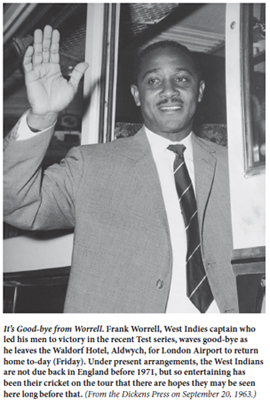 |
 |
 |
|
May 2017
|
He was distressed he said because when he listened to the Professor describe the work he has done (featured on Page 7), he realized just how far and phenomenal had been his reach. “How is it that the luminaries, say in computer science, cannot be found in any texts?” He explained that there was nothing biographical to be found about them, so students did not grasp their importance or the range of their work. It struck me enough that I contacted Williams a couple weeks later, just to ask him why this mattered. In the course of our conversation, he talked about how Lloyd Best’s ideas had subconsciously permeated him with the feeling that “I can be part of making society.” It seems that developed into feelings of responsibility, of belonging and of caring about the country’s welfare. It was why I had been struck when he spoke at the lecture. For almost a year, I have been gathering information on the life of Sir Frank Worrell for a biography. March 13 marked 50 years since his death in 1967 at the age of 42. I have been hither and thither following any clue I can find to bring texture and detail to the life of a man who has been a monumental figure in the development of West Indian civilization, but who is mostly remembered as the first black captain of the West Indies cricket team, and the captain of the tied Test at Brisbane, Australia in the 1960-61 series. Frank Worrell filled a much larger role, and I am writing about this here because the question Mr. Williams asked of Professor Hosein is relevant to a whole Caribbean pantheon, who are robbed of their chance to be true exemplars because we have not recorded or paid tribute to their accomplishments. Few people know that as Warden and Director of Sports at The UWI (at Mona and then St. Augustine) Worell was all about nurturing and mentoring students. Few people know how zealously he travelled the length and breadth of this Caribbean chain to help set up facilities, coaching and training programmes for cricketers. Few people know how many times he took money from his own pockets to finance all sorts of developmental undertakings. Sir Frank did not study at The UWI, he graduated from the University of Manchester, where it seemed he became acquainted with Arthur Lewis, who was a professor of economics there (and the first black man to be appointed a professor in the UK), and it may have been through Sir Arthur, who became Vice-Chancellor of The UWI, that he was encouraged to take up an appointment at the Mona Campus. The research so far has been fascinating as a deeply complex picture of the man emerges. The problem is that because we have not been good archivists, records are lost and people who knew Sir Frank well are disappearing from our midst. In a sense then, this is a public appeal for information. If anyone has any knowledge to share about Sir Frank, especially about his early childhood years in Bank Hall, Barbados, I would be happy to hear from them. |


 After Patrick Hosein delivered his first professorial lecture – an academic rite of passage – many questions came from the small audience at the Engineering Lecture Theatre. The one that struck me the most was the one from Irwin Williams, a 35-year-old software architect who had done the Data Communications course with Hosein as part of his Master’s programme.
After Patrick Hosein delivered his first professorial lecture – an academic rite of passage – many questions came from the small audience at the Engineering Lecture Theatre. The one that struck me the most was the one from Irwin Williams, a 35-year-old software architect who had done the Data Communications course with Hosein as part of his Master’s programme.